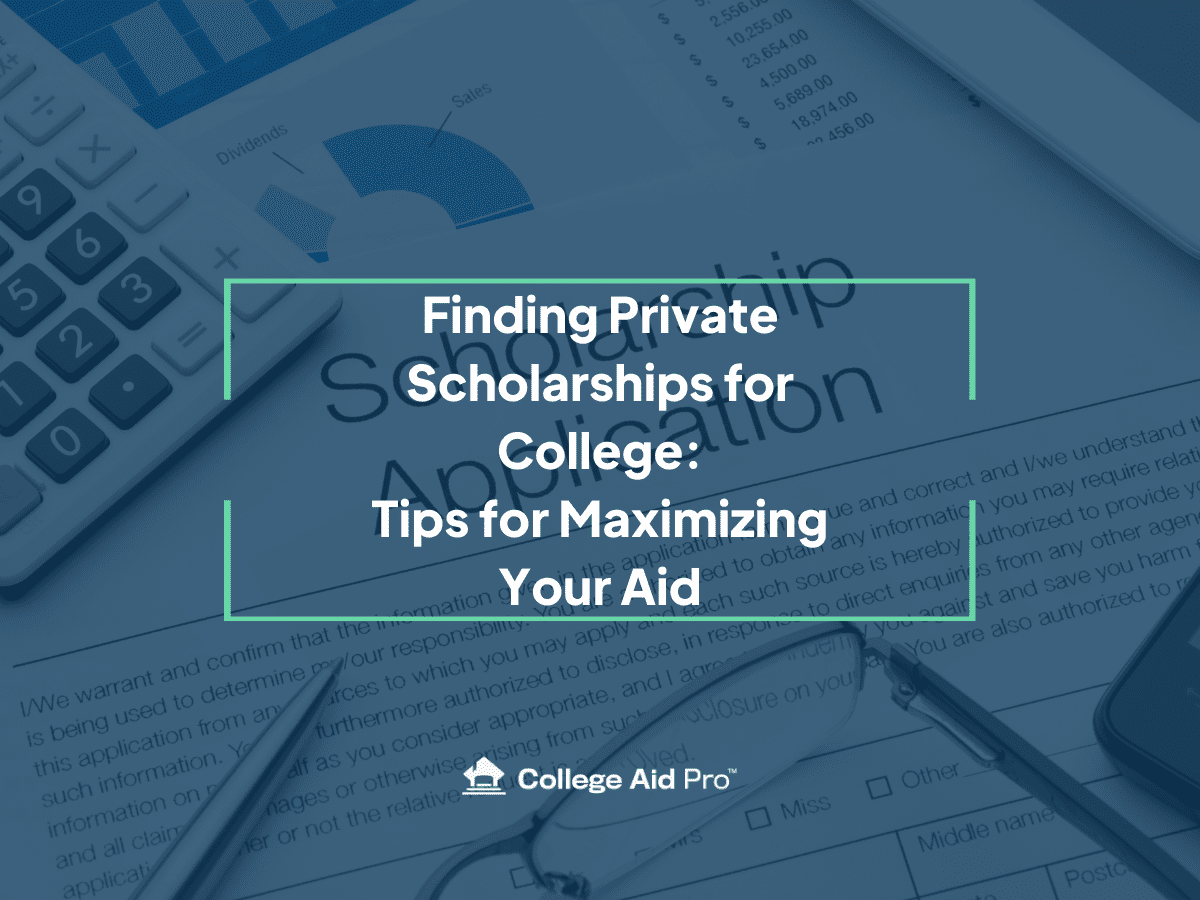Finding Private Scholarships for College
Paying for college is a big challenge, especially with tuition and expenses going up. While financial aid, automatic scholarships from schools, and student loans are common options, private scholarships can give students even extra money for college. Private scholarships are financial aid from outside organizations or private groups. In this blog, we’ll explore private scholarships for college students, how they work, the different types, their benefits, and how to find and apply for them.
Understanding Private Scholarships For College
Private scholarships, also called outside scholarships, help students pay for college. Unlike federal student aid, private scholarships come from private organizations or individuals. These scholarships can be competitive but offer students a chance to get more money for college expenses. They can add to other financial aid like grants, loans, or work-study programs, helping students fill the gap between college costs and available funds.
How Private Scholarships Work
Private scholarships for college offer additional financial help for tuition, expenses, and sometimes even personal costs. Most private scholarships have their own applications that a student submits. Some may also require additional information like a transcript or financial information. Sometimes the money goes directly to the college, covering part of the student’s bill. Other times, the money goes to the student, who then uses it for college expenses. Each scholarship has its own rules so make sure you read and understand the requirements.
Types of Private Scholarships For College
Private scholarships come in three main types: merit-based, need-based, and student-specific.
Merit-Based Scholarships
Merit-based scholarships are awarded to students based on their academic or extracurricular achievements. They recognize students for hard work, leadership, or talent usually in a particular field. Things to know about merit-based private scholarships for college:
- Achievements: These scholarships are awarded to students who excel academically, show leadership, or have exceptional talent in a specific area.
- Qualifications: Students must meet specific requirements, such as a minimum GPA or being in a specific extracurricular activity.
- Application Process: Students may need to send in transcripts, recommendation letters, personal statements, and essays answering specific questions as part of their application.
- Award Amounts: These scholarships can be small or cover full tuition, depending on the program and student’s qualifications. They may be a one time payment, or a recurring scholarship for all four years.
- Benefits: Merit-based scholarships not only give money but also boost resumes, showing academic success.
Need-Based Scholarships
Need-based scholarships are awarded to students based on their financial need for college education. These scholarships aim to assist students who may not have the financial resources to cover the cost of college. Things to know about need-based private scholarships for college:
- Financial Need: These scholarships are awarded to students who demonstrate financial need, determined by forms like Free Application for Federal Student Aid (FAFSA) or other financial aid application processes.
- Application Process: Students typically need to fill out the FAFSA or a separate financial aid application, providing detailed information about their family’s financial situation.
- Eligibility Criteria: Students must meet the scholarship’s requirements, like income limitations, family size, or other factors related to financial need.
- Award Amounts: The award amounts vary based on need and available funds.
- Benefits: Need-based scholarships help students pay for college and reduce the need for loans
Student-Specific Scholarships
Student-specific scholarships are designed for students who meet specific qualifications or belong to certain groups. Examples include:
- Underrepresented Groups: Student-specific scholarships are available for underrepresented groups, such as minorities, women, or those from disadvantaged backgrounds. These scholarships aim to promote diversity, equity, and inclusion in higher education.
- Field of Study: Some scholarships are tailored for students pursuing a specific field of study, such as STEM (science, technology, engineering, and mathematics), business, or the arts. These scholarships offer financial assistance to students dedicated to a particular academic discipline.
- Specific Talents or Hobbies: Student-specific scholarships may also focus on students with unique talents or hobbies, such as athletic scholarships, scholarships for musicians, or scholarships for students involved in community service. These scholarships recognize students for their exceptional abilities outside of the classroom.
How to Search for Private Scholarships for College
Searching for private scholarships for college requires a strategic approach to maximize scholarship opportunities. Here are some effective ways to search for private scholarships for college:
Leveraging Online Scholarship Search Engines
Online scholarship search engines provide a convenient way to find a wide range of private scholarship opportunities. Here are some tips for leveraging online scholarship search engines:
- Refine Your Search: Use advanced search filters to refine scholarship opportunities based on eligibility criteria, qualifications, or field of study. This allows you to focus on scholarships that align with your specific interests and qualifications.
- Set Email Alerts: Subscribe to email alerts from scholarship search engines to receive notifications when newly available private scholarships that match your criteria are added to the database. This helps you stay updated on the latest scholarship opportunities.
- Check College Websites: Regularly check the scholarship opportunities listed on college and university websites. Many institutions offer scholarships that require separate applications. These are usually competitive scholarships.
- Create Personalized Profiles: Create a profile on scholarship search platforms to receive personalized scholarship recommendations tailored to your qualifications, educational pursuits, and career aspirations. These platforms use algorithms to match students with scholarships that are a good fit for their unique circumstances.
Consulting Your High School Counselor
Your high school counselor can be a valuable resource in the search for private scholarships for college. Here’s how you can benefit from consulting with them:
- Gather Insights: Seek assistance from your high school counselor to gather insights on private scholarships that are well-suited to your educational goals, qualifications, and financial need.
- Schedule a Meeting: Schedule a one-on-one meeting to discuss scholarship opportunities, application strategies, and additional resources that can aid your scholarship search.
- Attend Workshops or Information Sessions: Inquire about scholarship workshops or information sessions organized by the school’s guidance department. These events provide valuable information and resources to help you explore private scholarship opportunities.
- Develop a Timeline: Collaborate with your counselor to develop a scholarship application timeline and submission plan. By mapping out the steps and deadlines, you can maximize your opportunities for securing scholarships.
- Get Personalized Guidance: Request personalized guidance from your counselor to navigate the scholarship application process. They can provide valuable insights into eligibility requirements, application instructions, and methods for standing out among applicants.
Investigating Community Organizations
Community organizations, such as local businesses, nonprofits, and civic groups, often offer private scholarship opportunities for college-bound students. Here’s how you can investigate community organizations for scholarships:
- Connect at Events: Engage with community organizations by participating in events, workshops, or networking sessions. These opportunities allow you to connect with organizations that offer private scholarships for college-bound students.
- Research Scholarship Opportunities: Investigate scholarship opportunities provided by community-based organizations that align with your educational aspirations, financial circumstances, or personal achievements. Many organizations prioritize students’ community involvement, leadership potential, or unique qualifications.
- Volunteer for Community Projects: Volunteering for community projects and initiatives can establish connections with organizations that support educational endeavors through private scholarships. Engaging with the community can also enhance your eligibility for scholarships that consider community service a key criterion.
- Network and Seek Referrals: Reach out to community members, mentors, or professionals who have knowledge of private scholarship opportunities. Networking and seeking referrals can lead to scholarship opportunities that may not be widely advertised.
- Explore Opportunities for Community College Students: If you are attending a community college, research scholarship opportunities available specifically for community college students. Organizations may offer scholarships to students pursuing education at the community college level, helping to cover educational expenses.
Exploring College-Specific Scholarship Programs
Colleges and universities often offer their own scholarship programs to help students afford the cost of tuition and expenses. Here’s how you can explore college-specific scholarship programs:
- Inquire About Opportunities: Inquire about scholarship opportunities available for students pursuing a bachelor’s degree in various fields of study. Many colleges have scholarship programs specific to their institution, offering financial assistance to eligible students.
- Utilize College Resources: Explore college websites, financial aid office resources, and student portals for information on institutional scholarships and tuition assistance programs. These resources provide valuable information on the scholarship opportunities available at the college.
- Attend Informational Sessions: Attend college-sponsored scholarship fairs, informational sessions, and financial aid workshops to learn about college-specific scholarship offerings. These events provide opportunities to connect with scholarship advisors and gain insights into eligibility criteria and application procedures.
- Connect with Admissions Representatives: Connect with college admissions and financial aid representatives to gain a better understanding of scholarship opportunities and eligibility requirements. These professionals can guide you through the application process and offer personalized advice.
- Review Program Requirements: Review the requirements, application deadlines, and award disbursement processes of college-specific scholarship programs. Understanding the program details empowers you to make informed decisions about the scholarships for which you want to apply.
Applying for Private Scholarships For College
Applying for private scholarships requires careful attention to detail and a proactive approach. Here’s what you need to know when applying for private scholarships:
Understanding Eligibility Criteria and Application Requirements
Students must understand the eligibility criteria and application requirements specific to each scholarship program. Here are some important points to consider:
- Thoroughly Review Eligibility Criteria: Carefully read and understand the eligibility criteria for each private scholarship. Ensure that you meet the requirements, such as academic qualifications, community involvement, financial need, or membership in a specific group.
- Gather Application Requirements: Familiarize yourself with the application requirements, which may include academic transcripts, essays, recommendation letters, proof of extracurricular activities, or personal statements. Ensure that you collect and prepare these documents well in advance of the application deadline.
- Follow Application Guidelines: Evaluate the scholarship application guidelines, paying close attention to submission formats, deadlines, and any additional documentation required. Adhering to these guidelines demonstrates respect for the scholarship program and increases your chances of being considered for the award.
- Seek Clarification: If you have any questions or ambiguities about the eligibility criteria or application instructions, reach out to the scholarship sponsors or organizations for clarification. It’s important to have a clear understanding of the scholarship program’s requirements before submitting your application.
- Align Application Materials: Tailor your scholarship application materials, including personal statements, essays, or resumes, to the specified eligibility criteria and application guidelines. Highlight your qualifications, achievements, and personal experiences that make you a strong candidate for the scholarship.
Tips to Stand Out in the Scholarship Application
With the high level of competition for private scholarships, it’s essential to find ways to stand out from the crowd. Here are some tips to make your scholarship application memorable:
- Demonstrate Passion and Purpose: Show genuine passion for your academic pursuits and future career aspirations in your scholarship application materials. Convey a sense of purpose and clarity in how the scholarship will help you achieve your goals.
- Highlight Unique Experiences: Emphasize unique personal experiences, challenges you have overcome, or lessons you have learned that have shaped your character and values. These personal anecdotes humanize your application and make you a memorable candidate.
- Reflect on Personal Growth: Incorporate a reflective and introspective narrative in your scholarship application, highlighting personal growth, development, and resilience. Share stories of how you have evolved academically, personally, or professionally, demonstrating your ability to learn from and adapt to challenges.
- Showcase Individuality and Diversity: Celebrate your individuality, diverse perspectives, and potential contributions to the academic community in your scholarship application. Highlight how your unique experiences, background, or interests will enrich the college campus and create a more inclusive environment.
- Articulate Future Impact: Articulate a clear vision for how you intend to utilize the scholarship funds to advance your educational journey and make a positive impact on the community or society as a whole. Share your long-term goals and aspirations, illustrating the broader impact of investing in your education.
In conclusion, private scholarships provide invaluable support for college students, offering financial relief and numerous benefits. They alleviate the burden of tuition fees and other expenses, enhance resumes, and foster personal growth. By leveraging online tools, seeking guidance from counselors, exploring local opportunities, and tapping into college programs, students can discover a wealth of private scholarship options. When applying, it’s crucial to understand the eligibility criteria, gather necessary materials, and craft compelling applications. Private scholarships not only ease the financial strain of college but also open doors to new opportunities and future success.



